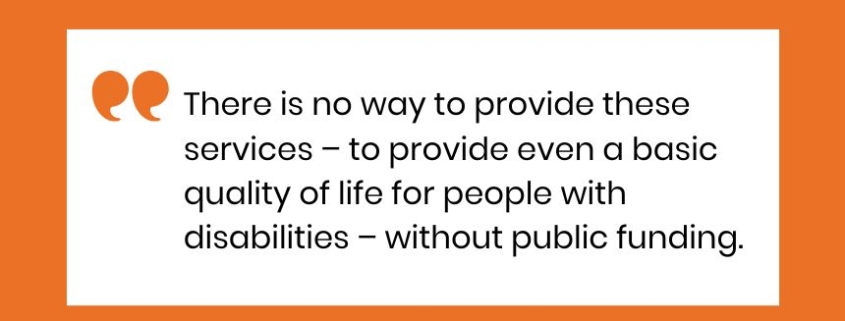Kenneth
Kenneth
I have worked in organizations that support people with intellectual and developmental disabilities for most of my career – as a Direct Support Professional, as a manager, as a trainer, and as an administrator. I took on this work originally as a “summer job” while I was in graduate studies in engineering at RPI.
Before I started this work, I had no personal connection with anyone who had an intellectual or developmental disability. I had no idea what their lives were like, or what types of support they needed. From the start, I was overwhelmed by the intensity of their needs and the dedication of those who made it their lives’ work to provide support that enables these individuals to live a life of dignity. I now know how much work is involved, and the tremendous positive impact it has.
There is no way to provide these services – to provide even a basic quality of life for people with disabilities, without public funding. These services rely almost entirely on Medicaid funding. Other sources (including charitable giving) are simply unable to meet the level of need.
I also now have a brother-in-law with intellectual disabilities who relies on Direct Support services. He requires round-the-clock support from a team of Direct Support Professionals. He cannot provide for himself, as he has minimal employable skills. Yet he is artistic, creative, musical, and his presence lights up a room.
I have done the work of a Direct Support Professional, and have first-hand experience seeing the impact of their work. It is hard to describe the challenges of the job, or the dedication of those who do this work, day after day. Yet these workers are hardly appreciated, or even noticed, by society at large. And because of the limited funding for these services, they barely earn a living wage for the work they do. I worry that it is becoming harder and harder to sustain our Direct Support workforce -and I know how much people with disabilities rely on good Direct Support staff to remain safe, healthy and happy.
There is much debate about the role of government versus individual responsibility. However, if we value human life at all – in whatever form it manifests itself, with or without disability – then I feel there is a clear mandate for society to provide for those who, through no moral failure or fault of their own, are simply not capable of providing for themselves.
History shows that without adequate funding, most of these individuals would barely survive in horrendous, inhumane conditions – or may not survive at all. Medicaid has been by far the primary means by which we have supported people with care and dignity. Anyone who has done the work knows that, if anything, more funding (not less!) is needed. Personally, I am happy to know that part of my taxes goes to provide this type of funding – I view it as a social responsibility, and an honorable thing to provide for “even the least of these.”





